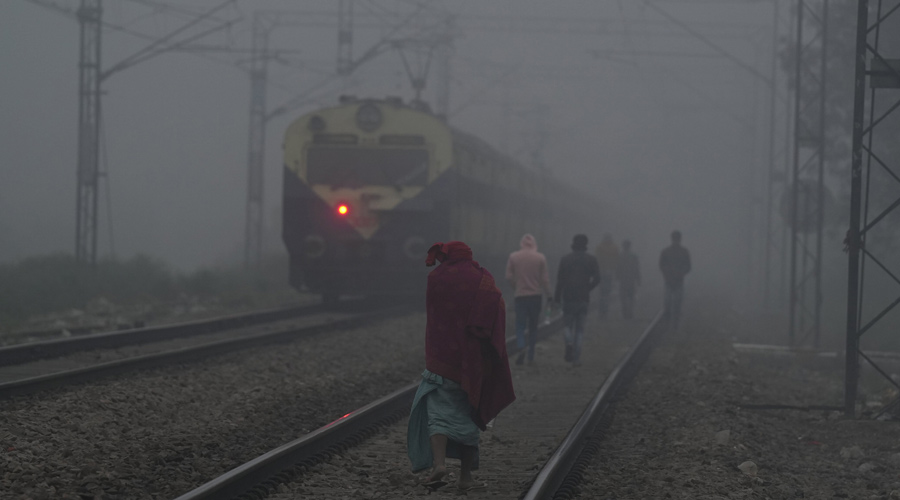Dense fog blotted out the sun in northwest India, including Delhi, on Tuesday morning, lowering visibility to just 50 metres in the national capital and affecting road traffic and train movement.
Fifteen trains to and from Delhi were reported running late, while two were rescheduled, a Railways spokesperson said.
With a high windchill factor – a measure of the rate of heat loss from skin that is exposed to the air – in play, the weather office has predicted a cold day ahead.
A cold day is when the minimum temperature is less than or equal to 10 degrees Celsius and the maximum temperature is at least 4.5 degrees below normal. A severe cold day is when the maximum is 6.5 degrees or more below normal.
The windchill factor is based on wind speed: The higher the wind speed during cold weather, the colder it feels on the skin if a person is outside. Delhi clocked a top wind speed of 15 kilometers per hour (kmph) on Monday. Winds gusting up to 16 kmph are likely on Tuesday.
The capital shivered under a "severe" cold day on Monday, with the maximum temperature dropping 10 notches below normal at some places.
The Safdarjung observatory, Delhi's primary weather station, recorded a maximum temperature of 15.6 degrees Celsius on Monday, six notches below normal and the lowest day temperature in December since December 17, 2020.
On Tuesday, Safdarjung logged a minimum temperature of 5.6 degrees Celsius -- a notch below normal. The maximum temperature is predicted to settle around 16 degrees Celsius.
Meteorologists attributed the sharp drop in day temperatures to frigid north westerly winds barrelling through the plains and reduced sunshine due to foggy weather.
Mahesh Palawat, vice president (meteorology and climate change), Skymet Weather, said a western disturbance led to a fresh spell of snowfall in the mountains on December 25-26 and cold northwesterly winds are now sweeping through the plains after its retreat.
He said the wind chill factor is also high.
Dense to very dense fog prevailed in some parts of the National Capital Region (NCR), Haryana, Punjab, west Uttar Pradesh and north Rajasthan on Tuesday.
According to the India Meteorological Department (IMD), "very dense" fog is when visibility is between 0 and 50 metres, 51 and 200 metres is "dense", 201 and 500 "moderate", and 501 and 1,000 "shallow".
In the plains, the IMD declares a cold wave if the minimum temperature dips to four degrees Celsius or when the minimum temperature is 10 degrees Celsius or below and is 4.5 notches below normal.
A "severe" cold wave is when the minimum temperature dips to two degrees Celsius or the departure from normal is more than 6.4 degrees Celsius.
Except for the headline, this story has not been edited by The Telegraph Online staff and has been published from a syndicated feed.











